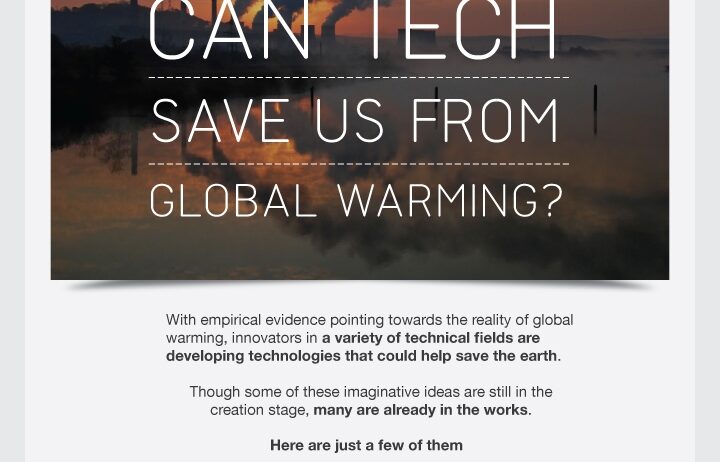As the world grapples with the existential threat of climate change, an intriguing question emerges: Can technology truly rescue us from the perils of global warming? While technology has undeniably contributed to environmental degradation, it also holds the potential to be a powerful ally in the fight against climate change. This article delves into the innovative solutions that could reshape our trajectory, yet it invites a contemplative challenge: can we trust these advancements to deliver us from our self-inflicted riddle?
To understand the role of technology in combating climate change, we must first acknowledge the anthropogenic factors that have catalyzed this crisis—rising greenhouse gas emissions, deforestation, and overreliance on fossil fuels, to name a few. These elements have made the combat against global warming an urgent imperative. Enter technology: a domain overflowing with possibilities for transformative change.
One of the most promising areas of technological innovation is renewable energy. Solar, wind, and geothermal power harness nature’s energy more efficiently than ever before. Revolutionary advances in solar photovoltaic technology have led to significant increases in energy conversion efficiency, while wind energy installation has expanded dramatically, contributing to a notable decrease in carbon emissions. However, this raises a pertinent question: can these renewable resources replace fossil fuels rapidly enough to stave off the impending climate emergency?
Moreover, energy storage technology has made salient strides. Batteries and other storage solutions are crucial in addressing the intermittent nature of renewable energy sources. The development of lithium-sulfur and solid-state batteries showcases the potential to significantly enhance energy storage capabilities and reduce reliance on pollutive power plants. Still, the challenge remains: will we be able to transition to a comprehensive energy infrastructure capable of accommodating these advancements on a global scale?
As the transportation sector is a primary contributor to greenhouse gas emissions, transformative technologies within this domain are critical. Electric vehicles (EVs) are increasingly touted as a solution to reduce reliance on fossil fuels. Innovations in battery technology are significantly extending the range of EVs while simultaneously lowering production costs. However, will the quick adoption of EVs sufficiently mitigate the emissions in time? The rise of autonomous driving might also hold promise, possibly leading to more efficient traffic flow and reduced emissions. Yet, does reliance on intricate software systems undermine their reliability in mitigating the climate crisis?
In addition to transportation, urban planning is experiencing a tech-driven evolution called smart cities. These urban ecosystems leverage data and technology to optimize resources, reduce waste, and foster energy efficiency—all formidable strategies in combating global warming. However, the challenge persists: can we ensure equitable access to these technological benefits for all communities, or will these innovations merely serve the well-off, exacerbating existing inequalities?
Agriculture, too, is undergoing a technological renaissance. Precision farming, using techniques like drone monitoring and sensor technology, is revolutionizing how we cultivate food. By minimizing water wastage and optimizing nutrient application, these innovations could greatly reduce the agricultural sector’s carbon footprint. This prompts another ponderous challenge: as we implement these high-tech solutions, how can we balance them with traditional farming practices that have sustained communities for generations?
Biotechnology represents yet another frontier in our battle against global warming. Innovations such as genetically modified organisms (GMOs) aim to create crops that require fewer resources for growth and yield greater produce. Advances in synthetic biology may make it possible to capture carbon directly from the atmosphere, turning it into usable materials. Yet, with this burgeoning field comes apprehension: can ethical standards keep pace with the speed of biotech innovation? How will societal acceptance influence the adoption of such technologies?
Circular economy principles, driven by innovative thinking, are essential in reducing landfill waste and promoting sustainability. By designing products for longevity and recyclability, businesses can minimize waste and encourage responsible consumption. Technologies that facilitate recycling processes or upcycling initiatives can further bolster these efforts. However, will businesses prioritize sustainability over profitability, or will the pursuit of economic gain thwart these commendable initiatives?
Importantly, the human aspect cannot be neglected. Educational technology is imperative in empowering individuals to understand and tackle climate change threats. By utilizing platforms for knowledge dissemination and skill-building, communities can engage actively in climate action. Nevertheless, there exists a formidable challenge: how can we ensure that everyone has access to this educational technology, thus fostering a collective movement towards sustainability?
Finally, while the allure of technology in combating global warming is compelling, it is imperative to approach these advancements with both optimism and caution. Reliance on tech solutions may delude us into overlooking the fundamental shifts needed in human behavior and policy. Solutions must be integrated into wider systemic changes—be it through regulatory frameworks, economic incentives, or cultural shifts—to build an adaptive society resilient to climate change.
In conclusion, technology harbors vast potential to bolster our response to climate change, offering innovative pathways towards a sustainable future. However, the challenges—ethical considerations, societal inequities, and the balance between innovation and sustainability—manifest as hurdles that must be navigated judiciously. As we ponder the question of whether technology can save us, it is crucial to remember that it is not merely the tools at our disposal, but our collective will to implement and embrace these solutions that will determine the future of our planet.







